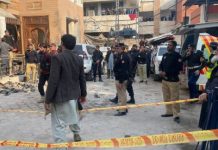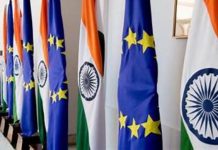Once again, Pakistan finds itself at a standstill, roads blocked, cities sealed, transport suspended, and millions stranded, even before a single protester has set foot on the streets. The Tehreek-e-Labbaik Pakistan (TLP) has announced yet another march towards Islamabad, and in anticipation, the government has shut down major highways, inter-city routes, and entry points across Punjab. Lahore wears the look of a besieged city, and Islamabad, the destination of the planned march, has effectively been cut off from the rest of the country.
The irony could not be more glaring. The TLP march, reportedly to protest against the killing of Palestinians in Gaza, comes at a time when peace has already returned to the region after months of devastating conflict. The ceasefire, fragile as it may be, has brought relief and hope to millions. In such circumstances, the justification for a “Gaza solidarity march” has all but evaporated. The timing and motives, therefore, have raised serious questions, is this really about Gaza, or is there something deeper and more political behind the move?
For ordinary Pakistanis, however, these questions are of little comfort. What they feel today is anger, frustration, and helplessness. Roads are closed, schools are shut, offices are empty, and transporters have pulled their vehicles off the roads. The economy, already staggering under the weight of inflation and unemployment, is now bleeding further losses ,running into hundreds of millions of rupees each day. Traders complain of shuttered markets and lost business opportunities, while daily wage earners lament another day without income.
A march that hasn’t even begun has paralyzed half the country. The very mention of a TLP procession is enough to trigger nationwide closures and panic. It is a reflection not only of the group’s disruptive power but also of the state’s inability or unwillingness to manage them.
The bigger question is: why is the TLP repeatedly allowed to hold such marches that bring life to a standstill? While the right to peaceful protest is enshrined in every democracy, Pakistan’s experience with such movements has rarely been peaceful. Previous TLP sit-ins in Islamabad have resulted in violence, vandalism, and deadly clashes with law enforcement. They have disrupted national life, damaged property, and caused immeasurable harm to Pakistan’s global image.
Yet, every time, the pattern remains the same ,a sudden announcement, an overreaction by the government, widespread panic, and eventually, a negotiated settlement that leaves the group emboldened and the public disillusioned.
If the TLP’s cause this time was truly humanitarian, the question remains: why march to Islamabad? why should Pakistan already battling economic crisis, political instability, and a fragile security environment be plunged into further chaos over an issue that has already seen diplomatic closure?
Perhaps, as many political observers suggest, the Gaza slogan is only a convenient pretext. There may be political calculations at play visibility, relevance, and leverage in a rapidly shifting political landscape. If that is indeed the case, it is deeply unfortunate. Using a tragedy like Gaza for domestic political gains only weakens genuine causes and deepens national cynicism.
The cost of these recurring episodes is far greater than a few days of traffic disruptions. Every such crisis chips away at the country’s credibility, both at home and abroad. Pakistan is already struggling to attract foreign investment. The recent uptick in security concerns, combined with political volatility, has made investors wary. Many foreign companies operating in Pakistan are reportedly scaling down operations or exploring exit options, citing uncertainty and security fears.
The current shutdown with roads blocked and transport halted only reinforces the perception that Pakistan remains an unpredictable and unstable place to do business. For international observers, it sends a simple but damaging message: this is a country perpetually in crisis.
At such a critical time, Pakistan’s civil and military leadership must come together to find a permanent solution. The state cannot afford to be repeatedly held hostage by one group or another. Dialogue, yes but not at the cost of national paralysis. Tolerance, yes but not for chaos.
There is also a collective responsibility that goes beyond the government. The so-called “powers that be” whether political, religious, media, or business all claim to act in the national interest. Now is the time to prove it. If everyone indeed “listens to them,” as the popular saying goes, then they must use their influence to avert this crisis before it escalates. The costs are too high, and the patience of the people too thin.
Pakistan stands at a crossroads. It can either continue down this path of reactionary governance closing cities and silencing daily life every time a group announces a protest or it can enforce the rule of law and reclaim its streets for its citizens.
The fear that one march can shut down the country is itself a national tragedy. It speaks to the weakness of our institutions and the erosion of public confidence in the state’s ability to maintain order. For a nation of 240 million, blessed with potential and resilience, it is heartbreaking to see daily life grind to a halt at the whim of a few thousand agitators.
It is time to end this cycle of paralysis. The people deserve better a government that governs, a system that works, and streets that remain open for those who simply want to live, work, and hope.
Because if every march means a lockdown, every protest means paralysis, and every slogan means fear then the real casualty is not the government or the TLP. It is Pakistan itself.

















